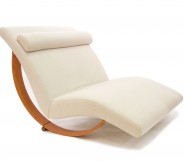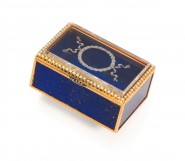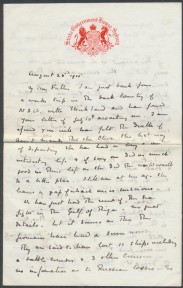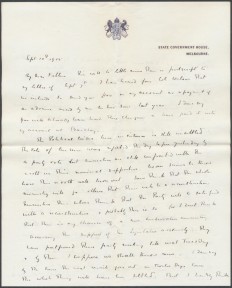Lot #619 - SIR ARTHUR LYULPH STANLEY, GOVERNOR OF VICTORIA 1914-1920
-
Auction House:Mossgreen
-
Sale Name:Australian History Featuring the David & Leslie Frost Collection of Australian and Colonial Antiques
-
Sale Date:09 Oct 2016 ~ 12noon - Part 1: Lots 1 - 374
17 Oct 2016 ~ 10am - Part 2: Lots 374 - 924 -
Lot #:619
-
Lot Description:SIR ARTHUR LYULPH STANLEY, GOVERNOR OF VICTORIA 1914-1920
A correspondence of more than 70 complete original letters sent by Sir Arthur Lyulph Stanley to his father Edward Lyulph Stanley, the Lord Sheffield, between the years 1914 and 1919. Previously unknown, the letters bear out, provide strong evidence of, and elaborate upon what we already know of Stanley, as is synthesised best in his Australian Dictionary of Biography entry. -
Notes:Contextualising excerpts from the biography of Stanley from the Australian Dictionary of Biography Sir Arthur Lyulph Stanley (1875-1931) was born in London, the eldest son of Edward Lyulph Stanley, later 4th baron (d.1925), and his wife Mary Katharine, nŽe Bell. Belonging to one of England's most famous ruling families, Arthur spent his childhood at the Stanley seats in Cheshire and north Wales. He was educated at Eton and Balliol College, Oxford, and served with the militia in the South African War. In 1902 he was called to the Bar at the Inner Temple and two years later was elected to the London County Council. In 1905 he married Margaret Evelyn Evans Gordon. Stanley was Liberal member for the Eddisbury division of Cheshire from 1906-10 and parliamentary private secretary to the postmaster-general. In 1913 Stanley was offered the governorship of Victoria. He was appointed K.C.M.G. in January 1914 and he arrived in Melbourne on 22 February and "his youthful appearance, 'homeliness' and undisguised anxiety to please made a favourable impression". The First World War largely determined and dominated his duties: he traversed the State encouraging donations to patriotic funds and supported recruiting drives. Sir Arthur faced a complex and unique social and political situation. Since Federation no Victorian governor had seen out his full five-year term and the governorship had been "beset with dissatisfaction, frustration and controversy". There had been agitation to appoint only Australians to the position and some critics on the Left argued for the abolition of the office. Stanley came to agree with these sentiments, albeit for different reasons. He found little work to do; ministers resented any interference in their affairs and, as both governor and governor-general then resided in the same city, the presence of the state governor was "awkward, confusing and superfluous". In August 1917 Stanley offered to resign, though when requested by the Colonial Office to remain a further year, he reluctantly agreed. After suffering a duodenal haemorrhage, he left Melbourne on 30 July 1919 on a leave of absence and his appointment ended on 30 January 1920. A director of the National Bank of Australasia and of the Australian Mercantile, Land & Finance Co., Stanley briefly returned to Australia in 1923. That year he failed by 80 votes to win a seat (Knutsford) in the House of Commons. He was chairman (1925-28) of the Royal Colonial Institute and of the East Africa Joint Committee. Stanley died of actinomycosis on 22 August 1931 in London following an operation. His wife, a son and three daughters survived him. Excerpts from and observations about the letters Stanley can certainly be seen as an intelligent and interesting chronicler of the Australia that he witnessed during the time in which he found himself here. He writes in considerable detail about the machinations of state and federal Australian politics and about the important issues besetting both arenas at the time, as well as Australian society as a whole, most notably the First World War, the matter of conscription and 1918/19's deadly outbreak of the Spanish Flu. He describes Australian Prime Minister William Hughes, for example, as "a charlatan" (2 February 1919) and is deeply concerned by where Hughes' outspoken opinions may lead the Empire at large (2 February 1919). So too, in his letter of 2 May 1915, he writes, We are gradually hearing of the doings of the Australians in Turkey but so far no details except that they have landed and repelled some determined attack by the Turks. A small casualty list has been published today and we are told not to expect any news for some time. Notably, his voice is very much one of an outsider. He was privately less than enthusiastic about the British colony in which he found himself, writing as early as 7 September 1915, "But I suppose until the War is over I must not think of escaping from this place." It is one of many such references. In 1919, he was still "negotiat[ing his] departure" (2 February 1919). Equally he is often acerbic in his observations about his surrounds, writing during a visit to Admiral Bridges in Victoria's Western District, "It is ugly flat country which just now looks its worst owing to the drought. The House [of Admiral Bridges] is small and without any architectural pretension." (5 December 1914) So too, as with so many foreign descriptions of Australia during this period (and before), a kind of rough exotica is depicted. We saw a good many snakes [on a visit to South Australia] including one which came aboard and was found coiled up within six inches of Galway's head. We put it into a cigar box and gave it to a cabin boy. (22 October 1916). Equally, though he is of course a representative of Britain, he is often scornful of Australian genuflection towards the Mother Country and its offices. Relating an incident in which a past Governor of Tasmania and a past Governor of Victoria helped an old woman wheeling a pram. "Do you know who has helped you?" [asked one of the men] "No," said the old woman. "This [said the Governor of Tasmania] is the Governor of Victoria and I am the Governor of Tasmania! When you get home write on a piece of paper that the child has been helped in its perambulator by two Kings representatives!! It will be of interest to him when he grows up." my comment on this fatuous tale was that if the child had after talked much about the episode that he would get well kicked by his school fellows. (1 November 1915) Indeed, Stanley (along with other state governors) is in constant low level conflict with the Governor-General and finds his own role ill-defined and often empty. The numerous references to this situation and the troubled "channels of communication" (28 August 1915) between the state and federal representative of the Crown highlight the curious tension between a British subject representing the Mother Country and Australian-born subjects seeking to represent Britain. Remarkably by the end of the correspondence, though, Stanley has come to some interesting conclusions. The real fact is I am afraid that the average Australian does not care twopence for the "Old Country" but rather dislikes and despises it. They think themselves infinitely superior to any thing [sic] that England can produce and in their hearts are looking to the time when they will set up on their own. In their minds their soldiers are braver [,] their workmen more competent and every one of their institutions social and political far superior than any thing [sic] England can produce. At the same time they are bitterly jealous of England and demand almost savagely that any Englishman they meet should admit this superiority. (2 February 1919). This collection, in its breadth and detail, would be a great primary source asset to any scholar of this period of Australia's history. Dr Emily Turner-Graham, 2016.
-
Estimate:A$5,000 - 10,000
-
Realised Price:
-
Category:Memorabilia
This Sale has been held and this item is no longer available. Details are provided for information purposes only.















